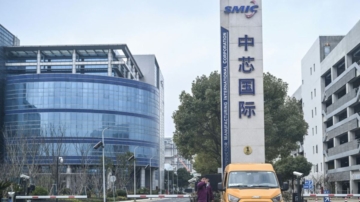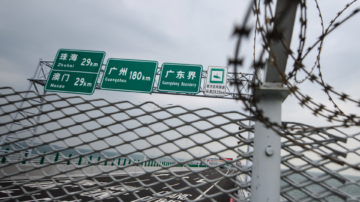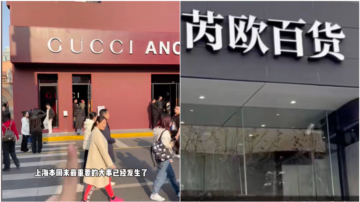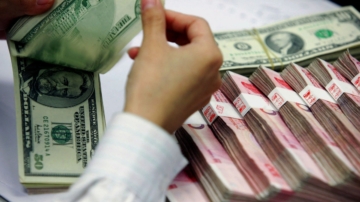【新唐人2012年9月15日讯】中国经济“三驾马车”之一的主力——外贸进出口,订单正在持续下滑,有些外销服装的中小企业,早已撑不下去,开网店在国内自寻生路。针对外贸持续放缓,中共国务院最近通过多项振兴方案。但,能扭转一路下滑的外贸出口困境吗﹖我们来看专家怎么分析。
由于2008年底之后的全球经济风暴影响,中国大陆出口订单锐减,一些中国服装商家最近转型开网店,企图在电子商务行业扩张的同时,转战国内市场。网店客服人员黄先生介绍,确实有不少外销服装业转战网店。
淘宝网店客服人员黄先生:“比较多这种情况,因为在网上销售不限地区,可以拓宽销路。”
中国大陆的中小企业在困境中寻求出路,转战国内市场,恐怕也是无奈之举。旅美中国经济学者“普林斯顿大学”社会学博士程晓农分析,外销商转向网购,面对国内市场,是抢占国内市场份额。
旅美中国经济学者程晓农:“少数几个出口厂家去抢,也许能够有点结果。如果大批的都想去抢,那是不可能的,而且还有个大问题,因为经济萧条,裁员的压力越来越大,物价上涨又很厉害,所以很多热衷于网购的白领,现在实际上购买力在萎缩。从趋势上来看,不见得网购市场就能每年保持高速度成长。”
稍早前,《路透社》针对20家机构的调查预测,中国大陆第3季GDP将连续第7季下滑,年增率只有7.4%。中共国务院在12号的常务会议上,通过了《关于促进外贸稳定增长的若干意见》,其中提出,加快出口退税进度、出口信用保险、贸易融资、降低通关成本、妥善应对贸易摩擦,依法实施进口贸易救济等八项政策措施。试图解决当前中国外贸面临的外需萎缩、企业经营压力加大等问题。
目前,中国面临的出口创汇急遽下滑,可谓内外夹杀。独立中国经济学家巩胜利分析,对外来说,欧美经济的问题短期内没法解决;而中国目前的企业运行,相对于全球的法治国家,它的成本应当是最高的。
独立中国经济学家巩胜利:“从以上两点来看,中国解决经济下行的这个问题,非一日之功。国内成本高有几个方面,税收高,还一个收费高。收费就是国家税收之外的,比如像罚款、比如说政府的管理费,方方面面的费。”
今年以来,中国外贸较去年同期明显放缓,特别是7月份后急剧下滑。巩胜利认为,中国经济整体下行,绝非表面出口创汇或者以投资拉动可以逆转,因为根源在国家政策出问题。
巩胜利:“中国是统治经济,就是中国的所有的金融、经济、商品、企业,都纳入中央的一统垄断。每个省、每个市、每个县都不可能有自己的方针和政策,全部纳入整体统治经济的鸟笼里面去,统一管理起来﹔对市场调节啊,现在是走到了历史的最低点。”
对于,目前中共国务院通过的八项政策,巩胜利指出,这只是试验式的短期行为。“中国特色”终将与全球市场经济国家再次发生冲突。
采访编辑/梁欣 后制/周天
China's Export Measures 'Only Experimental, Short Term Approach'
One of the main forces of China's economic “troika”—
import and export of foreign goods, continues to decline.
Some medium and small clothing export enterprises
are already struggling to survive in Mainland China.
Cyber stores on internet found its own path in China.
The State Council recently passed export measures
in an attempt to revitalize the continuous slowdown.
However, experts think this is only an experimental,
short term approach, as it is impossible to turn the tide.
Due to the global economic turmoil at the end of 2008,
orders for goods' export in Mainland decreased sharply.
Some Chinese clothing stores moved online, to battle
the market with the development of digital tools.
Taobao.com online store customer service' employee
Mr. Huang confirms the trend.
Mr. Huang: “Recently there are relatively more such cases,
as there is no restriction online, and one can expand sales.”
It seems that medium and small companies in China have
turned to the domestic market for a lack of other options.
Chinese economic expert and Princeton University’ scholar
of sociology, Dr. Cheng Xiaonong analyzes the issue.
Dr. Cheng thinks, export suppliers turning to online trade,
is seizing upon China’s domestic market’s share.
Dr. Chen Xiaonong: “Very few export companies seize upon
it, maybe there will be some results if a mass of them do this.
Yet, that would be impossible, and there’d be a big problem,
because of the economic recession.
The pressure of laying off employees becomes greater,
with the prices going up.
The purchasing power of many white collar workers
who are fans of online shopping, is now decreasing.
Looking at this trend, it does not seem the online
market can maintain a high growth rate every year.”
Earlier, Reuters reported of 20 agencies’ forecast that China’
3rd quarter GDP rate at 7.4% will be the 7th consecutive quarter of decline.
China's State Council have passed a proposal, “Concerns
for Stimulating Foreign Trade's Stable Increase and Other Suggestions” during its executive meeting on the 12th.
The document lists eight policy measures, like speeding up
the export process, addressing credit insurance, reducing the cost of customs clearance, etc.
The measures are an attempt to solve the problems,
that China faces with its foreign trade.
Currently, China is experiencing a drastic decline in export,
and trade dangers both internally, as well as externally.
Independent Chinese economist Gong Shengli analyzes,
Europe and US's economic problems can't be solved quickly.
Yet the way China's enterprises are run now, if compared
to law abiding countries, its costs should be the highest.
Gong Shengli: “From the above two points, China' economic
decline is not a problem that can be solved in a day.
There are a few factors for the high costs in China,
like the high national taxes for example.
Plus, besides the national taxes there are fees, like fines,
government admin fees, and fees in all aspects.”
This year, China's foreign trade have clearly slowed down,
compared to last year, with the slowdown being especially sharp since July.
Gong thinks, China' overall economic decline can’t be turned
around by superficial exports or creating currencies, because the problems stem from the nation's policies.
Gong Shengli: “China has a monopoly over the economy,
all the money, commodities and enterprises are dominated by the Central government.
It is impossible for each province, city and county to have
own policies, they are included in the overall ruling economic birdcage, and are managed uniformly.
Thus in terms of market adjustment,
it is at its historical low.”
As for the eight policy measures which were passed, Gong
said this can be only an experimental, short term approach.
The economy with “Chinese characteristics”
will once again clash with the global market economy.
由于2008年底之后的全球经济风暴影响,中国大陆出口订单锐减,一些中国服装商家最近转型开网店,企图在电子商务行业扩张的同时,转战国内市场。网店客服人员黄先生介绍,确实有不少外销服装业转战网店。
淘宝网店客服人员黄先生:“比较多这种情况,因为在网上销售不限地区,可以拓宽销路。”
中国大陆的中小企业在困境中寻求出路,转战国内市场,恐怕也是无奈之举。旅美中国经济学者“普林斯顿大学”社会学博士程晓农分析,外销商转向网购,面对国内市场,是抢占国内市场份额。
旅美中国经济学者程晓农:“少数几个出口厂家去抢,也许能够有点结果。如果大批的都想去抢,那是不可能的,而且还有个大问题,因为经济萧条,裁员的压力越来越大,物价上涨又很厉害,所以很多热衷于网购的白领,现在实际上购买力在萎缩。从趋势上来看,不见得网购市场就能每年保持高速度成长。”
稍早前,《路透社》针对20家机构的调查预测,中国大陆第3季GDP将连续第7季下滑,年增率只有7.4%。中共国务院在12号的常务会议上,通过了《关于促进外贸稳定增长的若干意见》,其中提出,加快出口退税进度、出口信用保险、贸易融资、降低通关成本、妥善应对贸易摩擦,依法实施进口贸易救济等八项政策措施。试图解决当前中国外贸面临的外需萎缩、企业经营压力加大等问题。
目前,中国面临的出口创汇急遽下滑,可谓内外夹杀。独立中国经济学家巩胜利分析,对外来说,欧美经济的问题短期内没法解决;而中国目前的企业运行,相对于全球的法治国家,它的成本应当是最高的。
独立中国经济学家巩胜利:“从以上两点来看,中国解决经济下行的这个问题,非一日之功。国内成本高有几个方面,税收高,还一个收费高。收费就是国家税收之外的,比如像罚款、比如说政府的管理费,方方面面的费。”
今年以来,中国外贸较去年同期明显放缓,特别是7月份后急剧下滑。巩胜利认为,中国经济整体下行,绝非表面出口创汇或者以投资拉动可以逆转,因为根源在国家政策出问题。
巩胜利:“中国是统治经济,就是中国的所有的金融、经济、商品、企业,都纳入中央的一统垄断。每个省、每个市、每个县都不可能有自己的方针和政策,全部纳入整体统治经济的鸟笼里面去,统一管理起来﹔对市场调节啊,现在是走到了历史的最低点。”
对于,目前中共国务院通过的八项政策,巩胜利指出,这只是试验式的短期行为。“中国特色”终将与全球市场经济国家再次发生冲突。
采访编辑/梁欣 后制/周天
China's Export Measures 'Only Experimental, Short Term Approach'
One of the main forces of China's economic “troika”—
import and export of foreign goods, continues to decline.
Some medium and small clothing export enterprises
are already struggling to survive in Mainland China.
Cyber stores on internet found its own path in China.
The State Council recently passed export measures
in an attempt to revitalize the continuous slowdown.
However, experts think this is only an experimental,
short term approach, as it is impossible to turn the tide.
Due to the global economic turmoil at the end of 2008,
orders for goods' export in Mainland decreased sharply.
Some Chinese clothing stores moved online, to battle
the market with the development of digital tools.
Taobao.com online store customer service' employee
Mr. Huang confirms the trend.
Mr. Huang: “Recently there are relatively more such cases,
as there is no restriction online, and one can expand sales.”
It seems that medium and small companies in China have
turned to the domestic market for a lack of other options.
Chinese economic expert and Princeton University’ scholar
of sociology, Dr. Cheng Xiaonong analyzes the issue.
Dr. Cheng thinks, export suppliers turning to online trade,
is seizing upon China’s domestic market’s share.
Dr. Chen Xiaonong: “Very few export companies seize upon
it, maybe there will be some results if a mass of them do this.
Yet, that would be impossible, and there’d be a big problem,
because of the economic recession.
The pressure of laying off employees becomes greater,
with the prices going up.
The purchasing power of many white collar workers
who are fans of online shopping, is now decreasing.
Looking at this trend, it does not seem the online
market can maintain a high growth rate every year.”
Earlier, Reuters reported of 20 agencies’ forecast that China’
3rd quarter GDP rate at 7.4% will be the 7th consecutive quarter of decline.
China's State Council have passed a proposal, “Concerns
for Stimulating Foreign Trade's Stable Increase and Other Suggestions” during its executive meeting on the 12th.
The document lists eight policy measures, like speeding up
the export process, addressing credit insurance, reducing the cost of customs clearance, etc.
The measures are an attempt to solve the problems,
that China faces with its foreign trade.
Currently, China is experiencing a drastic decline in export,
and trade dangers both internally, as well as externally.
Independent Chinese economist Gong Shengli analyzes,
Europe and US's economic problems can't be solved quickly.
Yet the way China's enterprises are run now, if compared
to law abiding countries, its costs should be the highest.
Gong Shengli: “From the above two points, China' economic
decline is not a problem that can be solved in a day.
There are a few factors for the high costs in China,
like the high national taxes for example.
Plus, besides the national taxes there are fees, like fines,
government admin fees, and fees in all aspects.”
This year, China's foreign trade have clearly slowed down,
compared to last year, with the slowdown being especially sharp since July.
Gong thinks, China' overall economic decline can’t be turned
around by superficial exports or creating currencies, because the problems stem from the nation's policies.
Gong Shengli: “China has a monopoly over the economy,
all the money, commodities and enterprises are dominated by the Central government.
It is impossible for each province, city and county to have
own policies, they are included in the overall ruling economic birdcage, and are managed uniformly.
Thus in terms of market adjustment,
it is at its historical low.”
As for the eight policy measures which were passed, Gong
said this can be only an experimental, short term approach.
The economy with “Chinese characteristics”
will once again clash with the global market economy.








